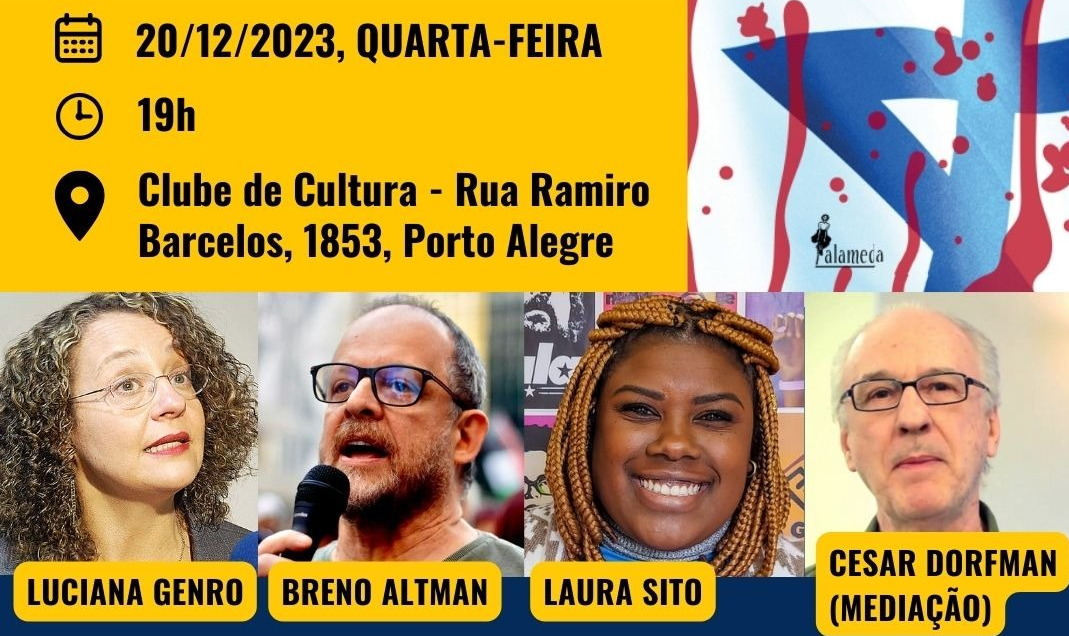Journalist and founder of Opera Mundi, Breno Altman, is launching his book Contra o Sionismo: retrato de uma doutrina colonial e racista (Against Zionism: portrait of a colonial and racist doctrine) next Wednesday (20/12) in Porto Alegre, at the Clube de Cultura (Culture Club), a venue chosen for its symbolic and historical content, since it was conceived in 1950 by a group of progressive Jews.
Altman’s book is born in the context of this new aggression promoted by Benjamin Netanyahu’s government, and points out the differences between Judaism and Zionism, demonstrates how Zionism has become a racist, colonial, and theocratic ideology, and shows how the result of years of conflict has been the construction of an apartheid regime that oppresses the Palestinian people in various ways.
Heir to a Jewish, communist, and anti-Zionist tradition, Altman’s work has accounted for more than 50 hours of participation in lives for independent media channels, as well as analysis and interviews for the shows he presents on Opera Mundi’s YouTube channel: 20 MINUTES and OCTOBER.
Due to the relevance of the topic and the journalist, these interventions were recorded and the texts have been prepared to be published as a book.
In addition to the launch at the Clube de Cultura, the event will feature a panel discussion mediated by Cesar Dorfman, from the Council of Architecture and Urbanism of Brazil, with the presence of Rio Grande do Sul state deputy Luciana Genro, founder and leader of the Socialism and Freedom Party (PSOL), as well as Laura Sito, also a state deputy for the Workers’ Party (PT) of Rio Grande do Sul.
The launching of the book at the Clube de Cultura is due to the significance of the space, which, since its foundation, has been “recognized as a place for political reflection and the defense of humanist values”.
 Breno Altman launches book ‘Against Zionism: portrait of a colonial and racist doctrine’ at Clube de Cultura in Porto Alegre on Wednesday (20/12)
Breno Altman launches book ‘Against Zionism: portrait of a colonial and racist doctrine’ at Clube de Cultura in Porto Alegre on Wednesday (20/12)
Clube de Cultura: a space of resistance
Carolina Baumann, the club’s cultural manager, told Opera Mundi that the space has a history of promoting “moments of political and social discussion” and that this is the place’s “role”.
“The dramatic situation in the Gaza Strip calls for deep reflection on freedoms, human rights, and people’s self-determination. This event is an important contribution to the discussion of this issue and we are happy to collaborate and promote this activity,” she said.
The Clube da Cultura was founded in 1950 by a group of young left-wing Jews who “were looking for a place to meet, discuss politics and carry out cultural activities”.
 Clube de Cultura formation meeting / Reproduction
Clube de Cultura formation meeting / Reproduction
May 1950 is the date that marks the meeting of around 30 young Jews, made up of progressive intellectuals, who wanted a place that could shelter them and be turned into a spot where “art and culture, as well as what they called ‘progressivism’, could be welcomed and developed”.
Until then, this same group held meetings, debates, and also a small library provided by a synagogue in Porto Alegre as a place to study. But, according to the Clube da Cultura cultural manager, gradually this space became hostile and, eventually, they were excluded from it.
“Inspired by the experiences of institutions similar to the one they were now creating, told by older people, immigrants, constituted in Central Europe by descendants of Jews, intellectuals, and who did not find in the synagogues the place of sociability of the Ghettos, the environment was favorable,” Baumann told Opera Mundi.
Conceived and inaugurated by progressive Jews, until the 1960s it was occupied by this community. However, through a members’ assembly, it was decided that the Clube da Cultura would also be open to non-Jews, making it a “more diverse entity, but without altering its founding essence”.
In this sense, 73 years after the Clube de Cultura was founded, the space is still a progressive reference point, which still produces and promotes art and political reflection, points that continue to be the “guiding principles” of the Clube’s actions.
 Clube de Cultura, in Porto Alegre, is still today a space for art and political reflection / Reproduction
Clube de Cultura, in Porto Alegre, is still today a space for art and political reflection / Reproduction
 Created by progressive Jews in 1950, the Clube de Cultura is still a place for meetings and debates today / Reproduction
Created by progressive Jews in 1950, the Clube de Cultura is still a place for meetings and debates today / Reproduction
“Over the years, the club has faced the dictatorial periods the country has experienced with the resistance of its activists and the support of the city’s cultural and political community. Nowadays we continue to be a space of resistance, both in defense of culture and in confronting the return of authoritarian discourse,” said the cultural manager.
Regarding the launch of Altman’s book this Wednesday at the Clube da Cultura, Baumann says that this event is “significant”, given that the club, since its foundation, has been a “recognized space for political reflection and the defense of humanist values”.
(*) Tradução de Pedro Marin













































































